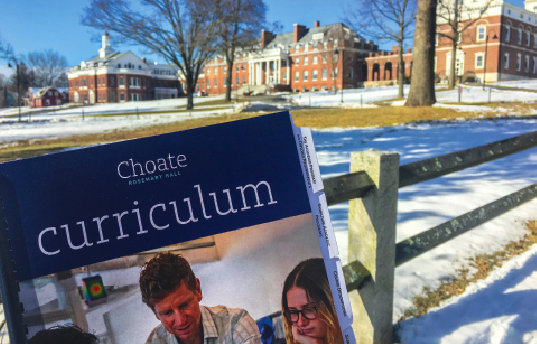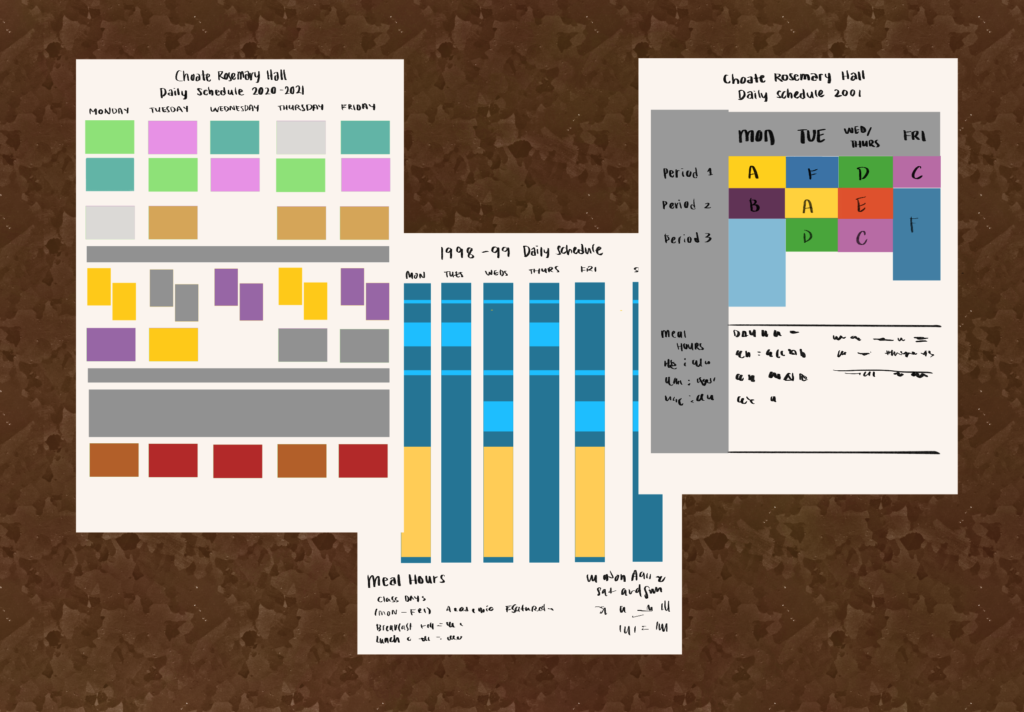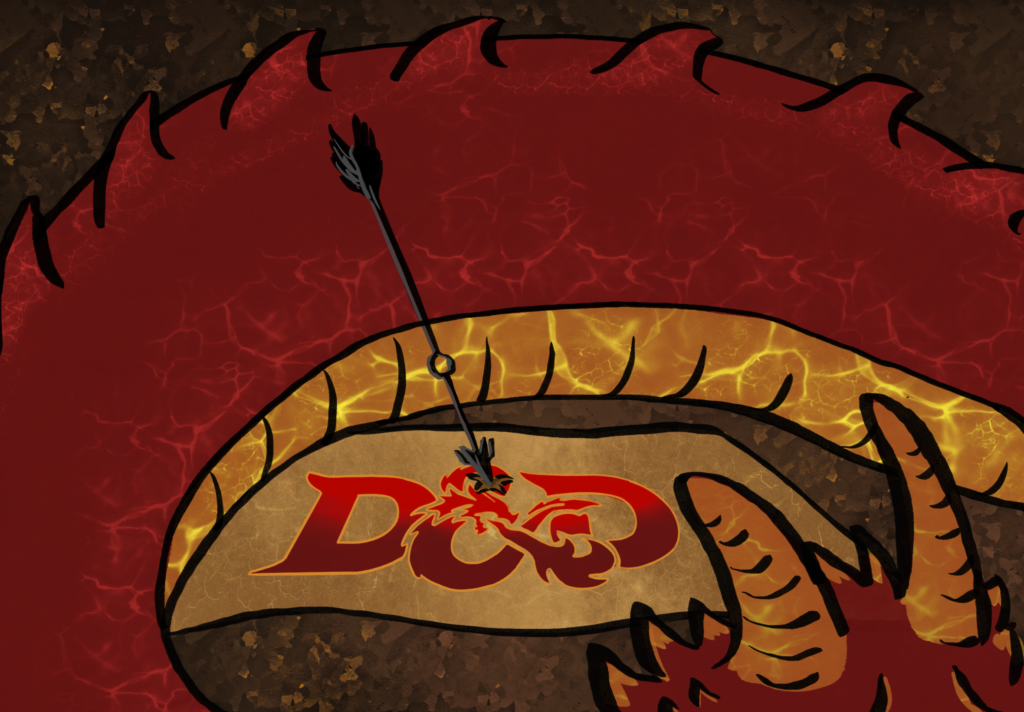
Choate’s new curriculum includes a robotics signature program and an additional ten hours of community service.
Winter term is coming to an end, and the longer and warmer days of spring mean that it’s time to check out the new course catalogue if you’re not a sixth former. Each year, the catalogue is reviewed by a panel of faculty members, including Academic Department Heads; the Director of Curricular Initiatives, Dr. Katie Jewett; the Dean of Faculty, Ms. Katie Levesque, registrar Ms. Catherine Velez; and Director of Studies Mr. Kevin Rogers, who discuss recommendations for updates. According to Mr. Rogers, “The depth and breadth of our offers is one of the things that sets our curriculum apart from many other institutions. The academic program at Choate is a tremendously powerful tool that students can use to advance their learning, especially if they are willing to take advantage of all of the ways to personalize it.” And indeed, this year, the addition of two new Signature Programs — the John F. Kennedy Program in Government and Special Service and the Advanced Robotics Competition — along with several new courses means that now, more than ever, students are able to tailor their education to their intellectual interests. Below are some changes that you can expect to see in the 2018-2019 course catalogue.
Arts
According to Department Head Ms. Kalya Yannatos, “The biggest change this year is in visual arts. We more clearly defined that you can take anything that we offer as a foundation level course and that you can continue into the upper level courses. If you really love something, you can continue doing it. We basically opened up the potential for a continuum of study.” Although that’s all for this year, stay tuned: there are a lot of new hires, and with that should come new changes. “I predict that we’ll be headed towards some gradual shifting in the near future,” added Ms. Yannatos. “But for the present, remember to always put in a second choice because if you don’t, we have to guess what your second choice would be.”
English
Beginning from next year, Advanced Creative Writing will satisfy two terms of the senior English requirement. On the flip side, Intensive Creative Writing will no longer be offered. According to Department Head Ms. Ellen Devine, the main reason for the first change was flexibility: “The English Department granted Advanced Creative Writing English graduation credit to provide greater choice in students’ overall course selection. Previously, students had to take Advanced Creative Writing in addition to another English class. That requirement created limits on what other classes students could take. We also made the change to acknowledge the significant and meaningful work students in Advanced Creative Writing do over the two terms.” For students who planned to take Intensive Creative Writing next year, Ms. Devine suggests to look into Reading and Writing Short Fiction or Reading and Writing Poetry instead. Both courses are offered in the fall and spring terms, and may be taken by fifth formers with departmental permissions.
HPRSS
Far and away the greatest change for HPRSS is the addition of the JFK Program in Government and Special Service. According to Department Head Ms. Amy Foster, “We had a lot of students interested in government, politics, and public service because of the classes that people sign up for and the capstones that they are interested in. We wanted students to explore these interests in more depth by creating a special program with a classwork, tutorial and internship requirement. We’ve been talking about this for a couple years and it finally got approved this year.” But that’s not the only change in HPRSS. There’s also a new course in Behavioral Economics that will be co-taught by an economics and psychology teacher and some minor designation changes. Political Ideologies is now an honors course, and American West is no longer an honors course.
Languages
In the Language Department, the most significant changes are the revision in 5th year courses across the board and the addition of a 6th year French course in digital humanities. According to Department Head Ms. Diana Beste, “Since the school has moved in the direction of not designating courses as AP, we continue to revise and refine our 5th year courses so that they are really courses that reflect what is of interest intellectually to our faculty and students. We also have been revising the 6th year curriculum in French. We’ve added a course called Statistique Et Numérique: What Computational Tools Can Tell Us About What We Read. In it, kids apply computational tools to the interpretation literature. By using basic coding, they can use the power of technology to illuminate the nuances of expression. This will be a huge gain for French students and we’ll want to see if we can extend it to Chinese and Latin and Greek and other languages.” On the study abroad front, there will be spring break trip to Southern Spain for the second time. Due to the large Islamic influence in the area, the trip will bring together Spanish and Arabic students. “It’s really exciting to have a spring break program that brings together two languages from very different traditions and two cultures together in the same spot,” added Ms. Beste. Finally, she stressed the ability to take fourth, fifth, and sixth level courses term by term. “Students should really know that they have flexibility. You can take a fourth year language course for the entire year, or for two terms or even one term. We’re really trying to make language more accessible to kids, and I’m hoping that students understand the flexibility they have.”
Math and Computer Science
Congratulations, lovers of robotics and budding engineers. There’s a new special program for you! The Advanced Robotics Concentration allows students to work collaboratively to design and create mechanical, electrical, and control systems with the goal of competing in the world-renowned FIRST® Robotics Competition. However, the one-term statistics course and four-term Honors Calculus will no longer be offered, though Honors Calculus will continue to be offered as a three-term course.
Science
With the exception of Cell and Molecular Biology moving to Winter-Spring from Fall-Winter, there are no changes for science this year. However, if you’re part of the class of 2020 or 2021, stay tuned. According to Department Head Mr. Ben Small, “We have teachers thinking about making courses in advanced physics, courses exploring materials science, changes in our chemistry electives, and potentially a course on the physics of sound and music.”
Community Service
All new students next year will have to complete ten hours of service for every year that they’re here. Ms. Melissa Koomson, Director of Community Service, explained the change as follows: “The idea behind it was a response to a curriculum review from a couple of years ago, in which folks wanted community service to be a more integral part of our community. There was also a general feeling that people could do a little bit more. Hours wise, it’s not as much of a change. It’s now spread out over all four years because there’s lots of developmental changes that happen between ninth and twelfth grade. What students get out of the experience will change over the four years — that was the rationale behind spreading it out.”
Wellness Program
If you enjoyed your wellness activity in the last two terms, you’re in luck: You can expect to see even more All-School Wellness Time next year. As Wellness Coordinator Dr. Holly Hinderlie and Dr. Jewett explained, “The goal of this programming is to provide a break in the busyness of students’ lives at Choate and to encourage them to try new activities that they may want to commit to doing as a regular way to de-stress.” The transition from Sophomore Seminar to Lifelong Wellness classes will also be completed next year. As stated by Dr. Hinderlie and Ms. Jewett, “ The Lifelong Wellness committee is hard at work designing a four-year curriculum to be introduced next year through Wellness classes and/or programming at every form level. Lifelong Wellness classes will replace Sophomore Seminar in the Fourth Form. Topics covered over the four-year sequence will include: stress management, relationships, time management, identity, and sex education among others.”




